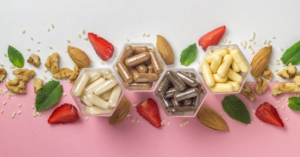Have you been feeling a bit off since starting prenatal vitamins? Maybe your digestive system isn’t quite as regular, or you’ve noticed some unusual itchiness. You’re not imagining it — some side effects of prenatal vitamins are more common than you’d think. And the good news? There’s a lot you can do to feel better.
So, what’s really inside these vitamins? And why might they cause these minor hiccups? Let’s unpack the contents of prenatal vitamins, explore why they might cause discomfort, and share simple, actionable tips to get you back on track. Whether it’s a small change in your routine or advice from your doctor, you’ve got options to feel your best.
Remember, your comfort matters. With a little fine-tuning, you can embrace this exciting time with confidence, knowing you’re doing what’s best for both you and your baby’s development.
What Are Common Prenatal Vitamin Side Effects?

Some prenatal vitamin side effects can feel a lot like the usual quirks of pregnancy, making you wonder: Is it the vitamins, or just another pregnancy thing? Those hiccups (yes, even the literal ones) and waves of queasiness can be tricky to figure out.
The great news? Not everyone feels these side effects, and if you do, there are simple ways to ease the discomfort. A few small changes can help you feel better and keep your focus on the exciting journey ahead. Let’s explore how to make this a little easier for you!
Digestive Discomforts
Prenatal vitamins contain iron, an essential mineral your body needs to make red blood cells that carry oxygen to you and your baby. While iron is crucial for your health, it can sometimes cause digestive issues.

The most common complaint? Constipation. But you might also experience:
- Stomach cramps
- Upset stomach
- Bloating
- Gas
- Hard or small bowel movements
- Tarry or dark-colored bowel movements
These symptoms, while frustrating, are a natural reaction to the iron in prenatal vitamins. The good news? They’re manageable! With a few simple adjustments, you can stay comfortable and focus on your exciting journey ahead.
Unexpected Skin and Hair Changes

Prenatal vitamins are designed to nourish your body, but sometimes they can bring unexpected changes to your skin and hair. These side effects, while not dangerous, can feel frustrating.
Here’s a quick look at some common skin and hair side effects and the vitamins that might be responsible:
- Hair Loss: Excessive intake of vitamin A can lead to hair loss. A study published in the American Journal of Clinical Nutrition indicates that hypervitaminosis A is associated with alopecia and other systemic effects.
- Skin Dryness or Peeling: High doses of vitamin A, particularly in the form of retinoids, can disrupt the skin barrier, causing dryness or peeling. Research in Dermatology Research and Practice discusses vitamin A’s impact on skin cell turnover, leading to these symptoms.
- Skin Itchiness: Itchiness may arise from vitamin A toxicity or an allergic reaction to fillers in prenatal vitamins. A review in Clinical Toxicology highlights skin irritation as a symptom of chronic vitamin A overdose.
- Easy Bruising: Linked to excessive vitamin E intake, which can interfere with blood clotting by inhibiting platelet aggregation. A study in The Journal of the American Medical Association (JAMA) discusses the effects of high-dose vitamin E on bleeding tendencies.
- Skin Rash: High doses of vitamin E have also been associated with dermatological reactions, including rashes, as documented in research from Nutrients.
If you notice these symptoms, they could be a reaction to the high levels of certain vitamins in your prenatal supplements. Monitoring your intake and consulting with your healthcare provider can help you manage these side effects while keeping your pregnancy journey as smooth as possible.
Unexpected Aches, Pains, and Changes

Prenatal vitamins are packed with essential minerals like iron, calcium, and iodine to support you and your growing baby. But let’s face it—sometimes these power-packed nutrients come with a few less-than-pleasant surprises. Here’s a closer look at some of the side effects you might encounter:
- Hives
- Stomach bleeding
- Teeth staining
- Muscle weakness
And those minerals? They might also play a role in intensifying some common pregnancy quirks:
- Sore teeth and gums
- Stomach irritation
- Fast or uneven heart rate
- Frequent trips to the bathroom
- “Pregnancy brain” (hello, multitasking overload!)
- Confusion (let’s blame that multitasking again)
- Appetite loss
- Increased mouth watering (or is “eating for two” just making you hungrier?)
But wait—there’s more. Some regular pregnancy discomforts can feel amplified when paired with prenatal vitamin side effects:
- Headaches
- Back pain
- Muscle or joint pain
- Dizziness
- Strange or unpleasant taste in your mouth
- Dry eyes
- Blurred vision
- Unusual tiredness
If this list feels overwhelming, take a deep breath—you’re not alone. These side effects are part of the balancing act your body performs to support you and your baby. Keep an eye on what feels off, and don’t hesitate to check in with your healthcare provider. Together, you can tweak your routine to ease the discomfort and keep you feeling as strong and supported as possible. You’ve got this! 💪✨
Other Risks: What You Need to Know
Sometimes, too much of a good thing can turn into a bad thing—and that includes prenatal vitamins. Taking too many or using products with high doses of certain nutrients can pose risks to your health and your baby’s well-being.
While prenatal vitamins are essential, it’s crucial to pay attention to the vitamins and minerals you’re getting from other supplements, medications, or even skincare products. Overdoing it on some nutrients can be harmful. For example, too little vitamin A can lead to poor eyesight, but too much vitamin A can cause serious issues, like liver damage and birth defects.
Watch Out for These Ingredients
- Always let your doctor know about any vitamins, medications, or creams you’re using.
- Avoid vitamin A-based products during pregnancy, especially skin creams. Look out for these ingredients:
- Tretinoin (often found in acne treatments)
- Isotretinoin (used for severe acne or anti-aging products)
- Retin-A (a common prescription for skin issues)
- Retinol (frequently found in over-the-counter anti-wrinkle creams)
- Beta-carotene supplements (a precursor to vitamin A that can contribute to excessive levels)
The Trouble with Fat-Soluble Vitamins
Vitamins A, D, E, and K are fat-soluble, which means your body stores them for longer periods. This can lead to a dangerous buildup if you take too much, potentially harming both you and your baby. For example:
- Vitamin D overdose can cause kidney damage, nausea, and calcium buildup in your blood.
- Vitamin E in high amounts can increase the risk of bleeding and complications during delivery.
Minerals in Overdrive
Even minerals in prenatal vitamins can cause problems if taken in excess. For instance:
- Iron overdose can lead to nausea, vomiting, and even damage to your internal organs.
- Calcium in high doses may interfere with your body’s ability to absorb other vital nutrients like iron and zinc.
- Iodine can affect thyroid function if taken in large amounts, potentially leading to developmental issues for your baby.
If you think you’ve taken too much or experience severe side effects, don’t wait—seek medical attention right away.
Medication Mix-Ups
Prenatal vitamins can also interact with certain medications, creating unwanted side effects. Here are some to watch out for:
- Pain relievers like Aleve, Advil, or Motrin
- Blood pressure medications such as beta-blockers or ACE inhibitors
- Heart medications like digoxin
- Diuretics (water pills) that can alter potassium or calcium levels
- Trimethoprim and Sulfamethoxazole (commonly found in antibiotics)
- Thyroid medications like levothyroxine, which can interact with high doses of iron or calcium.
The takeaway? Always keep your doctor in the loop about anything you’re taking—vitamins, supplements, medications, or skincare products. With the right guidance, you can avoid these risks and enjoy a smoother, safer pregnancy journey. You’ve got this! 🌟
Why Do You Need Prenatal Vitamins? 🌟

Prenatal vitamins, often called prenatal supplements, are specially designed to provide the vitamins, minerals, and nutrients essential for you and your growing baby. They play a crucial role in supporting a healthy pregnancy and filling nutritional gaps that might otherwise be missed.
Why Take Prenatal Vitamins?
Preparation for Pregnancy
Doctors recommend that all women of childbearing age take prenatal vitamins—even if they’re not planning to get pregnant. Why? Pregnancy can happen unexpectedly, and the first few weeks of development are critical for your baby’s brain and spinal cord formation.
💡 Scientific Insight: A landmark study published in the New England Journal of Medicine showed that taking folic acid before and during early pregnancy significantly reduces the risk of neural tube defects (NTDs) like spina bifida and anencephaly. These defects develop within the first 28 days after conception, often before many women even know they’re pregnant.
Challenges in Meeting Nutritional Needs
Let’s face it—eating a perfectly balanced diet every day is easier said than done. Add to that the nausea, vomiting, or food aversions many women experience during pregnancy, and meeting your nutritional needs can feel like an uphill battle. For instance, getting the recommended five servings of fruits and vegetables daily might seem impossible.
✨ Scientific Insight: Research from Maternal Health, Neonatology, and Perinatology highlights that many pregnant women fail to meet their daily nutritional needs through diet alone. Prenatal vitamins provide a practical solution to bridge these gaps, ensuring you and your baby get the nutrients needed for a healthy pregnancy.
Early Development Support
From the very first month of pregnancy, prenatal vitamins ensure you’re getting the building blocks essential for your baby’s growth and development. Here’s how they help:
- Folic Acid: Prevents neural tube defects and supports a healthy spinal cord and nervous system. Research in the New England Journal of Medicine found folic acid intake could reduce NTDs by up to 70%.
- Vitamin A: Promotes healthy eyes and a strong immune system, reducing the risk of vision issues in newborns. (Maternal Health, Neonatology, and Perinatology)
- Iron: Boosts hemoglobin production to ensure oxygen reaches your baby. It also helps prevent maternal anemia, which is linked to preterm delivery and low birth weight. (Nutrients)
- Calcium and Magnesium: Build strong bones and teeth in your baby while preventing bone loss in the mother. (Nutrients)
Nutritional Insurance
Prenatal vitamins act as a safety net, ensuring you and your baby receive the essential nutrients needed for a healthy pregnancy. They’re especially important during those times when dietary intake is insufficient due to pregnancy symptoms or other challenges.
🌟 Scientific Insight: A review in Nutrition Reviews found that vitamin D supplementation during pregnancy improves maternal bone density and supports neonatal bone development. Prenatal vitamins ensure you’re covered, even when your diet falls short.
Conclusion
Prenatal vitamins are a game-changer for ensuring a healthy pregnancy. They provide critical nutrients that may be missing from your diet, support your baby’s development, and protect your own health. From reducing birth defect risks to helping with maternal recovery post-delivery, they’re an essential part of your pregnancy journey.
💡 Pro Tip: Talk to your healthcare provider to find the best prenatal vitamin for your needs and give yourself peace of mind as you nourish both yourself and your growing baby!
What’s in Prenatal Vitamins?

Most prenatal vitamins include:
- Folic Acid or Folate: Essential for brain and spinal cord development.
- Vitamin A, C, D, E, and K: For overall growth and immune health.
- Vitamin B12: Supports red blood cell production and nervous system health.
- Iron: Helps prevent anemia and supports the baby’s oxygen supply.
- Calcium and Magnesium: Crucial for bone development.
- Zinc and Copper: Aid in cell growth and immune function.
Not All Prenatal Vitamins Are the Same
Different formulations may vary slightly in their dosages of specific nutrients. It’s essential to consult your doctor to determine which prenatal vitamin is best for you.
💡 Pro Tip: Even though prenatal vitamins are vital, they’re not a substitute for a healthy diet. Focus on eating a variety of nutrient-dense foods, and let your prenatal vitamins fill in the gaps. Together, they help create the perfect foundation for a healthy pregnancy! 🌱
How to Manage Prenatal Vitamin Side Effects 🌟

Prenatal vitamins are essential for a healthy pregnancy, but they can sometimes cause side effects like nausea, constipation, or stomach discomfort. The good news is that with a few strategies, you can manage these side effects while still getting the benefits for you and your baby.
Why Prenatal Vitamins Are Worth It
Despite potential side effects, the benefits far outweigh the downsides when taken as directed. Prenatal vitamins provide the essential nutrients needed for your baby’s growth and development while supporting your overall health.
Tips to Minimize Side Effects:
- Follow Directions Carefully:
- Take your prenatal vitamins exactly as prescribed, in the correct dosage.
- Avoid doubling up on multivitamins, supplements, or herbal remedies while on prenatal vitamins—too much of certain nutrients can be harmful.
- Take With Food:
- Avoid taking prenatal vitamins on an empty stomach; always have them with or after a meal to reduce nausea.
- Stay Hydrated:
- Drink a full glass of water when taking your vitamin and stay hydrated throughout the day.
- Swallow Whole:
- Do not chew, crush, or cut your prenatal vitamin, as this can interfere with its absorption.
- Combat Constipation:
- Increase dietary fiber by eating more whole grains, oats, fresh fruits, and vegetables.
- Add natural prebiotics and probiotics like yogurt, bananas, and onions to improve digestion.
- Consider supplements like fish oil or probiotics—but consult your doctor first.
- Try a Different Formula:
- If iron causes stomach upset, ask your doctor about a prenatal vitamin with less iron.
- If you experience itching or irritation, the fillers or additives in your current vitamin may not suit you. Switching to another brand might help.
When to Talk to Your Doctor:
If side effects persist or become severe, consult your doctor for advice. They may:
- Recommend switching to a different prenatal vitamin.
- Suggest alternative supplements to help manage side effects like constipation or nausea.
💡 Pro Tip: Managing side effects is about finding what works best for your body. Stick to your prenatal routine and stay in communication with your doctor. By addressing side effects early, you can ensure a smoother, healthier pregnancy for both you and your baby! 🌱
Takeaway: The Importance of Prenatal Vitamins and Managing Side Effects 🌟

Prenatal vitamins are a cornerstone of a healthy pregnancy, supporting both you and your baby’s development. That’s why doctors recommend starting them before you even plan to get pregnant.
Key Points to Remember:
- Essential for Health: Prenatal vitamins ensure you and your baby get the nutrients needed for a healthy pregnancy and birth.
- Side Effects Are Common but Minor: While side effects like nausea or constipation can be annoying—especially since they overlap with pregnancy symptoms—they’re usually manageable with simple lifestyle adjustments.
- Serious Side Effects Are Rare: Most side effects aren’t serious and can often be addressed through home remedies, such as eating more fiber or drinking plenty of water.
When to Seek Medical Advice:
- Serious Reactions: Contact your doctor if you experience severe side effects or symptoms that don’t improve.
- Avoid Over-Supplementation: Taking too many prenatal vitamins or combining them with other supplements can harm you and your growing baby. Always consult your healthcare provider before adding new supplements to your routine.
💡 Final Tip: Prenatal vitamins are your safety net during pregnancy, but they work best when paired with a balanced diet and healthy lifestyle. Stay informed, listen to your body, and always follow your doctor’s advice for a safe and happy pregnancy! 🌱


